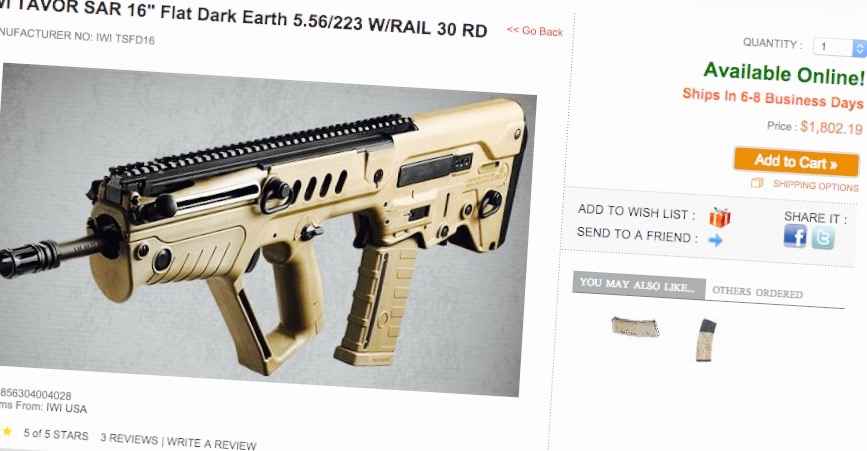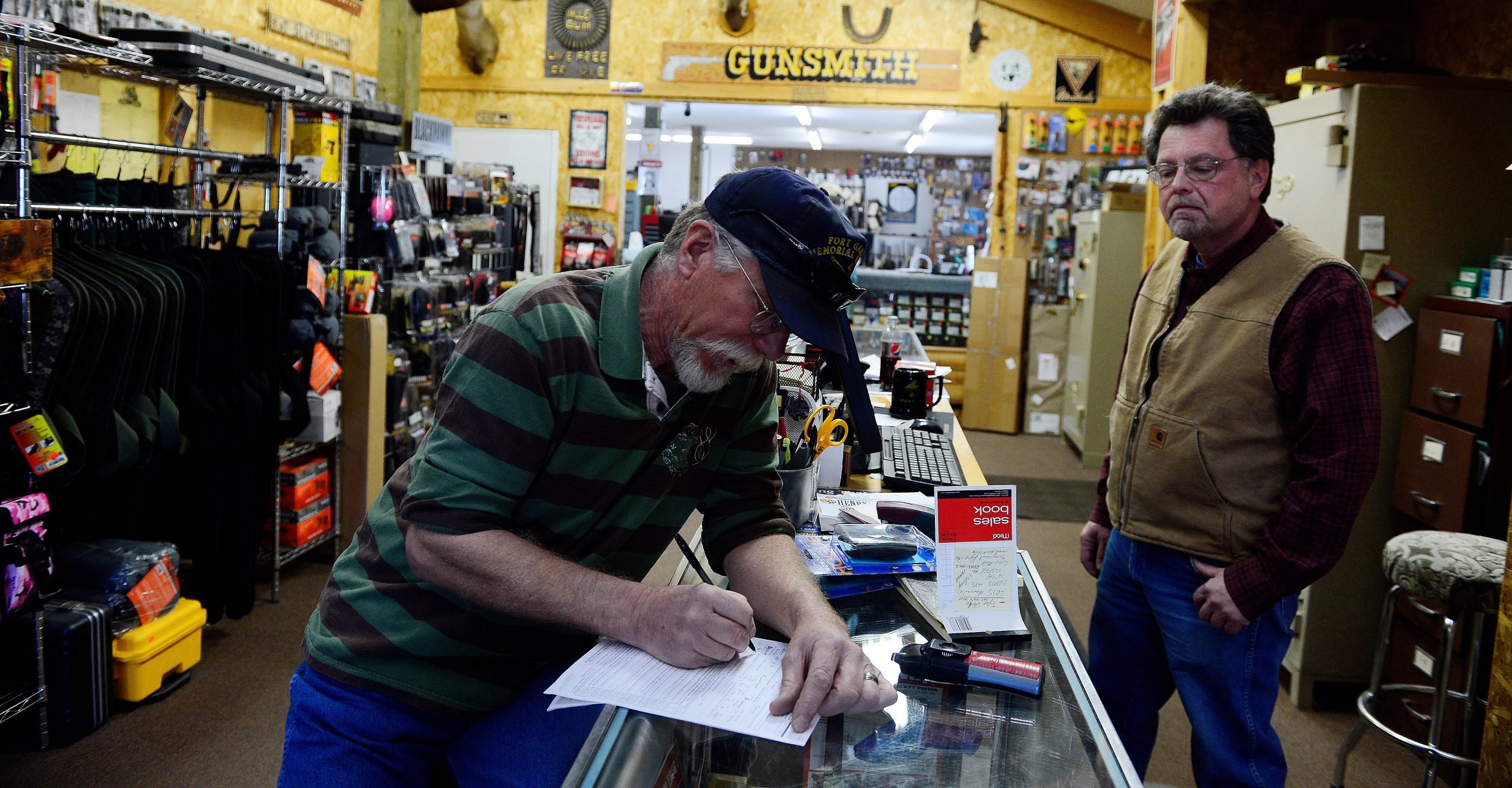Advocates of gun violence prevention have praised Facebook over the past week for its decision to ban private gun sales from the social network. Facebook’s new policy, enforced by reports from users, was announced at the end of a month that began with President Obama’s week of speeches and executive actions aimed at reducing gun violence. One of the most parsed moments in Obama’s speech unveiling his executive actions on guns on January 4th was a sentence that drew little interest from pundits and mainstream reporters.
“A violent felon can buy [a gun] over the Internet with no background check, no questions asked,” he said from the East Room, echoing a familiar refrain of advocates. Almost immediately, conservative critics pounced.
A writer at The Federalist said Obama’s remark was “so plainly not true.” The National Review writer Charles C.W. Cooke called the president’s statement “what is classically called a lie.”
Why are gun-control supporters so alarmed by Internet gun sales, and why do pro-gun voices often completely dismiss their concerns? The tension comes from the fact that Internet sales can involve two very different kinds of transactions: one regulated, and one not. Here’s how it all works.
My computer’s fired up, and I’m ready to buy a gun. Where do I start?
You have a few options. If you Google “online gun store,” you’ll find a slew of websites with names like Grabagun.com, Impactguns.com, and Budsgunshop.com that act like digital versions of physical gun stores. Websites like Gunbroker.com, in contrast, host auctions, much like eBay. Then there are sites that don’t conduct gun sales, but rather allow individuals to arrange sales. The most well known is Armslist.com — essentially a Craigslist for guns — but discussion boards like Glocktalk.com also often have sections dedicated to classified ads.
What happens when I make an online purchase from a gun store’s website?
You go through a background check.
Customers who purchase weapons from the website of a Federally Licensed Firearms dealer (FFL), like Kentucky-based Buds, can’t just enter their credit card and address and have a gun shipped to their doorstep. Instead, the seller will mail the gun to a local FFL, which will then perform a background check on the buyer before handing over the gun. In most cases, the local FFL will charge a transfer fee, usually $25–$50, for facilitating the transaction.
These rules apply to sellers with brick and mortar locations, like Bud’s, and those that conduct all their sales online, like Grabagun, which is based out of a Texas industrial park and has no storefront.
What if I buy through an auction site?
It depends on who’s selling the gun, and where you live.
Gun auction sites are a sales platform for both FFLs and private, unlicensed parties. Gunbroker.com claims to be the largest such site on the internet, with more than 143,000 firearms currently listed.
If the seller is an FFL, or if the winner of the auction lives in a different state (this applies whether the seller is a licensed dealer or a private one), the gun must be received at an FFL, where the buyer will go through a background check before taking it home. But if a private party sells a gun on an auction site to a buyer in the same state, they can sometimes ship it directly to the purchaser without performing a background check. The United States Postal Service will mail rifles and shotguns (but not handguns) between individuals inside state lines, so long as the shipper certifies the guns are unloaded. FedEx and UPS both prohibit the shipping of guns between individuals.
Here a second caveat comes in: Such sales can only occur in one of the 32 states where gun transfers between unlicensed individuals are not subject to a background check. The remaining 18 states and the District of Columbia place restrictions on private gun sales, and must have an FFL run a background check before a transfer is completed.
There’s some evidence that gun auction sites may be vulnerable to fraud. On the Gunbroker.com discussion forum, one user described a situation in which that buyer went to their local FFL to pick up the purchase — only to discover that it was a stolen gun. The licensed dealer that was handling the transfer turned over the gun to the Bureau of Alcohol, Tobacco, Firearms and Explosives (ATF). Gunbroker kicked the seller off the site, but the buyer didn’t get the gun, and was on his own when it came to getting a refund.
If I have to go to a brick-and-mortar store and get a background check before picking up the gun I bought on the Internet, then why the fuss over online gun sales?
Because of the other category of such transactions, where sales are arranged online but actually conducted in person. These are the deals that concern law enforcement and gun-regulation advocates.
If you think of online gun stores as being like Amazon and online gun auctions as like eBay, then sales arranged online but conducted in person are like Craigslist. And like transactions arranged on Craigslist, they are essentially beyond regulation.
Where do these kinds of arrangements happen?
The most prominent platform for arranging gun sales online and then completing them in person is Armslist.com. Like Craigslist, whose name Armslist deliberately echoes, the website is a platform for classified ads. Armslist maintains no inventory, but it hosts ads for thousands of guns (though the website does not allow users to see how many ads it hosts in total). Individuals can post ads with whatever information they please, and finish sales however they want. The site’s administrators disavow any responsibility to ensure that sales follow the law: as they say in their FAQ, “it is the sole responsibility of the buyer and seller to conduct safe and legal transactions.” The website provides essentially no information on how parties might comply with relevant local, state, and federal laws.
Sellers using Armslist don’t have to create an account. Buyers can also specifically search for listings from private parties — that is, those that are not licensed dealers, and who are under no obligation to conduct background checks. Private sellers using Armslist can go through an FFL to conduct the transfer if they wish. Or they can meet at a home or a parking lot, collect the buyer’s money, and hand over the gun, with no vetting involved. Though federal firearms law bans private sellers from selling guns to buyers they suspect may be prohibited from buying a weapon, it doesn’t mandate those sellers verify the sale is legal.
According to a study by Everytown for Gun Safety (a seed donor to The Trace), 90 percent of guns on Armslist are posted by private sellers.
Until January 29th, Facebook was also home to many private groups where gun owners arranged private sales, but the world’s largest social network has announced it will no longer allow users to arrange such person-to-person transactions on the site. In 2014, Facebook came under pressure to crack down on such transactions after it was used to facilitate illegal sales. Reddit has an entire section, r/GunsForSale, dedicated to facilitating buying and selling guns both between FFLs and private sellers, though the popular r/Guns subreddit bans such transactions. In a statement to Mother Jones, Reddit said it “neither condones nor does not condone the buying and selling of firearms through the site,” and makes no effort to monitor those exchanges for legality.
Are transactions on Armslist any different from those conducted by private sellers at gun shows or other physical locations?
Not really, but the fact that Armslist is online makes it different from gun shows in some important ways. It’s available all day, every day. It allows buyers to search for weapons anywhere in the country. And it offers sellers the option of anonymity.
In 2011, the City of New York and Mayors Against Illegal Guns, an earlier incarnation of Everytown for Gun Safety, conducted an undercover study of private gun sales arranged online. It found that 62 percent of the sellers contacted through Armslist and other websites agreed to continue with a sale even when the undercover buyers explicitly told them they probably couldn’t pass a background check.
Is there any proof that private sales arranged online actually put guns in dangerous hands?
Yes. One particularly gruesome example occurred this past August in Houston. David Ray Conley, a domestic abuser who was prohibited from owning a firearm, arranged to purchase a 9mm handgun over the Internet in a private sale. He used it to kill his former domestic partner, her boyfriend, and her six children.
Conley is not the only killer to have arranged a gun sale online when they should have been banned from buying any guns at all. In 2012, a Wisconsin man named Radcliffe Haughton bought a pistol on Armslist even though he was subject to a restraining order barring him from such a purchase. The day after he bought the gun, he used it to kill his wife and several of her coworkers.
To be sure, both Conley and Haughton broke the law when they bought their guns in this way.
But because the guns were purchased in private sales, there were no safeguards to prevent their illicit purchases from going through. Private sellers can ask buyers whether they have criminal records or other prohibiting factors; their customers can lie, and the seller has no way to check. When a sale goes through a licensed dealer — whether it originates from a computer keyboard, or with the buyer driving straight to a nearby gun store on a whim — that sale will involve a background check, which from 1998 to 2015 blocked sales to more than 2.5 million purchasers with personal histories designating them too high-risk to own a firearm.
[Photo: grabagun.com]
Correction January 8: An earlier version of this article misstated the number of gun sales background checks have blocked since 1998. That number is more than 2.5 million, not 1.2 million.



